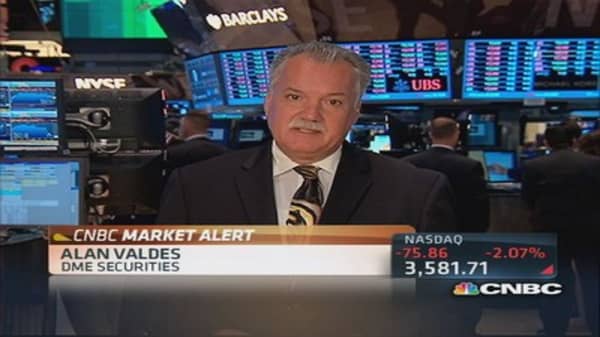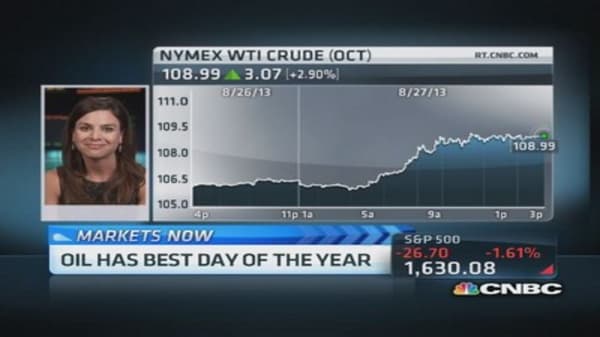Art Cashin, director of floor operations at UBS Financial Services said he is worried about the situation in Syria, calling it "another wide-open variable."
"I know some people are dismissing it as an excuse for a market that was looking to go down, but I think if you look at things like the spread between Brent and West Texas beginning to spread out, that tells you there is some real concern," he said.
(Read more: Cramer: This is the 'go-to' sector, despite Syria)
Oil prices settled above $109 a barrel, its best one-day gain of the year, amid worries that potential military action in the Middle East could disrupt oil production.
And Treasury prices gained. The benchmark 10-year Treasury yield eased to to 2.76 percent from 2.79 percent late Monday. Separately, the Treasury auctioned $24 billion in 2-year notes at a high yield of 0.386 percent. The bid-to-cover ratio, an indicator of demand, was 3.21, versus a recent average of 3.48.
Gold prices rallied to a 15-week high as the geopolitical tension sparked a flight to safer investments. European stocks suffered their biggest daily drop in two months.
On Monday, U.S. Secretary of State John Kerry said he believed Syria had used chemical weapons on its own people, and that the Syrian government must be held to account.
"I think [the Fed] desperately would love to taper but it's going to be difficult at this point for Mr. Bernanke to keep a straight face and say that this is a data-driven decision," said Cashin. "So far, the data's been lousy and unless he gets a miracle with the non-farm payrolls, I think it's going to be tough to justify tapering."
(Read more: Get ready for a'massive interest rate shock' soon)
Patrick Kernan of Cardinal Capital who trades S&P 500 options said the CBOE pit has been busier Tuesday than in recent sessions.
"But it is by no means crazy," he said. "Customers were buying short-dated options this morning and as the day progressed, people have been buying longer-dated options, to the end of the year. They've been moving their volatility buys further out."
Investors seem to be protecting more against a downside move, he said.





